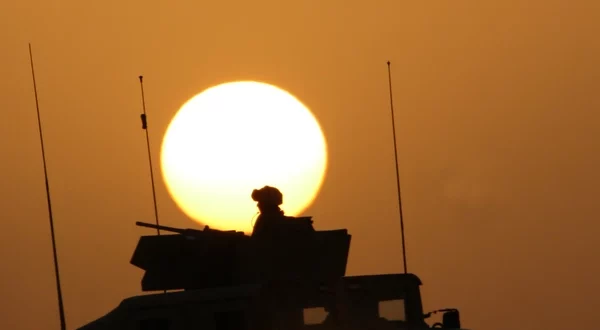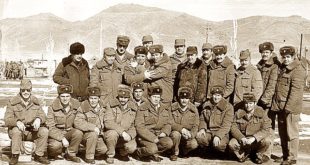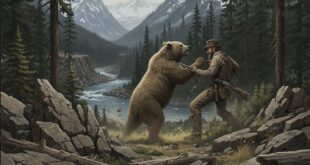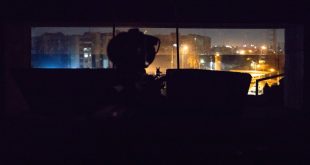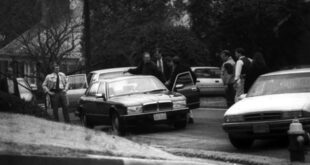by Mike Holmes
In late October 2005, my team and I had been dropped off in a terrible little place on the Baghdad-to- Amman highway called Ar Rutbah, to coordinate supply convoys coming out of Jordan with the Marines who controlled this sector. The convoys mostly carried fuel and supplies to Al Asad, and were chock full of things the locals liked to try and pirate from us on the long trips across the desert. We had been there for a little over a month, getting randomly mortared and sniped at by the locals, who found our presence a real hindrance to their piracy.
But all good things must eventually come to an end, and the time came for me and the team to rotate for home. I received an encoded message that a convoy from Jordan would be passing through our station within the next 24 hours, and that we should extract and go to Al Assad Air Base with them for an eventual redeployment home.
READ MORE about American forces in Iraq
The next morning before daylight, we met the convoy at the highway overpass just outside of our little Beau Geste-like fort. After a brief conversation with “Rawhide 6,” the SFC leading the convoy, we took up our place at the back — second to the last — for the 20 or so hours left of the ride home to Al Assad.
It turned into a nightmare.
The first IED hit us
We had not gotten more than about 30 minutes down the road when the first IED hit us. And that was just the first. Each time, we stopped, pulled off the highway into herringbones, and waited for the mortars that thankfully never rained down on us. After the site had been cleared and the wounded evacuated, we would start up again, passing the burning truck or humvee, and continue down the highway, just waiting for the next attack, and hoping it would not be us.
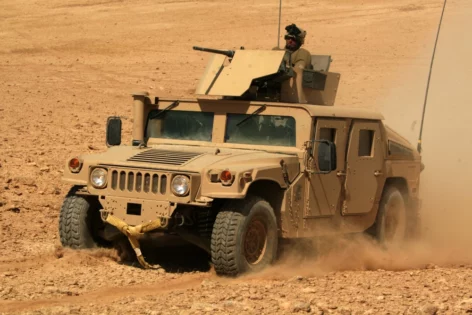
We were about halfway home, and it was approaching late afternoon. The terrain looked almost exactly like that stretch of I-10 between Phoenix and LA, except that there were no mountains in the distance. About an hour had elapsed since the last IED attack, which had blown up the truck ahead of me and killed the driver’s assistant. We all knew another attack was imminent. I was sitting in the front passenger seat. In spite of the apprehension, the sameness of the scenery and the rhythms of the road had lulled me into a stupor. I was surfing in a zone of extreme boredom between the wavetops of sheer terror.
Nothing was happening on the radio, except the occasional reports of checkpoints passed. We were a long line of strangers in the strangest of lands, united in our one desire to make it through this trip and get to a safer place where we could hide our heads in relative safety and sleep.
The military humvee is almost, but not completely, unlike its cousin on the civilian market. It will go damned near anywhere, and haul almost anything while doing so, but the comparison stops there. We were riding in a box that was noisy, hot, cramped, and designed by uncaring bureaucrats and engineers to torment soldiers of all sizes in some way. Comfort was secondary… no, it was way further down on the list… to function. In a grudging concession to our new reality in Iraq, the Army had added air conditioning, which came out of the dashboard in 1950’s style flexible tubes, one of which I had shoved up under my shirt-sleeve in an effort to cool down the areas underneath my fifty-odd pounds of body armor. The driver sat in a seat only slightly more advanced than a wooden bench, and the turret gunner sat up top in a large sunroof thing with his legs dangling between us — his ass literally in a sling of webbing and leather, with his head and shoulders poking above the thin armor.
Dealing with dust and hot, dry wind, constantly shifting his attention and the machine gun attached to it from left to right as he scanned the roadsides for danger, he occasionally kicked one or both of us down below, which may have been the only thing keeping us awake at this point. There was nothing glamorous or fun about it. It was, in fact, the opposite of fun. For hours.
Except that now the gunner up top startlingly swiveled his turret around to the back, kicking me in my helmeted head as he rotated. On the intercom he yelled, “Action! Six o’clock!” Within moments, the radio repeated his call, and gave directions for us all to stop and assume a defensive posture.
One of the tricks you soon learn as a soldier is going from full sleep to full alert and back again in moments. Instantly, I was at the top of this cycle. As the top gunner scanned for danger, the driver and I listened intently to the instructions on the radio.
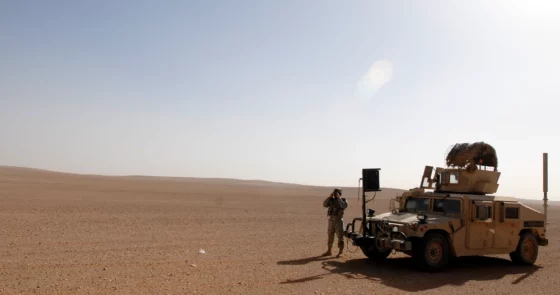
“Rawhide 6, Green 4. Engaged one victor at six o’clock. Target destroyed. Request EPW and Casualty Collection. Over.”
“Green 4, Rawhide 6. Roger. Break break. All stations, Foxtrot Alpha 2. Break break. Purple 1, can you assist? Over.”
Purple 1. That was us. I gripped the mic, “Rawhide 6, Purple 1. Roger. We‘ll follow EPW and Casualty to site. Over.” I looked over at my driver. He had heard and understood, and I saw him speaking to the top gunner on the intercom.
“Rawhide 6. Roger. Thanks. Out.”
“Lets go see dead people”
Even though I was just a passenger on this train, what had happened made total sense to me. The humvee behind us shot up a vehicle and we needed to stop and investigate. The fact that I was not only the only officer in the convoy, but a field-grade officer, was a lucky break for the sergeant in command of it. I had the clout to conduct a quick investigation and get us moving again.
Four humvees raced past us heading towards the rear and the site of the attack. I looked over at the driver.
“Let’s go see dead people.”
We made a U-turn and followed them towards the rear.
As we rolled up alongside Green 4, the trail vehicle that had made the initial contact, the scene before us was surprisingly calm. The four humvees carrying the search teams and casualty collection had formed a crescent facing an overturned and decidedly shot-up white Tahoe. Eight soldiers approached the vehicle cautiously with weapons ready. As the rest covered him, one soldier walked up to the Tahoe from the rear and peeked in the windows, just like a person might ease up on a pile of firewood they knew was hiding a rattlesnake.
After a moment to peek inside, the soldier pivoted and gave the hand and arm signal for all clear. He then beckoned the casualty collection team. I reckoned it was now my turn to go survey the damage.
You always expect that what we shoot at and kill probably deserves it, whether from stupidity or criminal intent. You always expect that we do the right things for the right reasons.
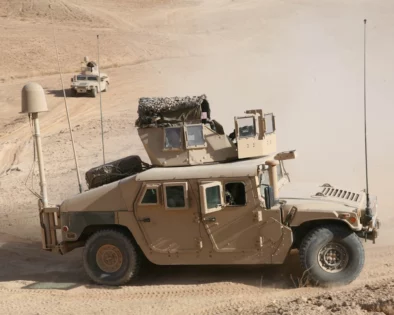
But sometimes things go wrong.
Horribly wrong.
Green 4 was equipped with a .50 caliber machine gun, a piece of one hundred year-old technology that is so effective at destroying heavy equipment, vehicles and airplanes it has not changed much at all since World War I. It’s an ounce-and a half projectile of lead and copper, a thing as big as a man’s forefinger, and flies at over 2,000 miles an hour towards its target. Within the same second, it is joined by 10 more just like it.
What these bullets had done to the Tahoe was devastating. There were several holes in the grill, and steam was billowing from the engine area. The windshield was punched through with at least six holes, and crushed-in between those holes.
But what these bullets had done to the inside of the Tahoe was even worse.
It had obviously been a family. Two parents. Three kids. He was headless and split open, mush dripping from his torso onto the ceiling that was now below him. She was torn in half, with her upper torso now lying on the ceiling and a surprised look on her once beautiful face. The kids had been in the backseat.
What .50 caliber bullets do to grownups is devastating. What they do to babies is obliterating.
I had seen enough
The smell of blood was overwhelming. I could taste it. And the dry heat was already turning it to mud. The smells of shit and other bodily fluids were secondary to that iron taste and it was making me grimace uncontrollably as it attacked whatever taste buds respond to that combination.
I had seen enough.
I turned and walked back to Green 4 for the real work. We had killed innocents. I had to know why. We would likely be paying restitution money, “blood money”, to the family. We needed facts, and it was my duty as the senior officer on the scene to collect those facts and make recommendations based upon them.
As I approached Green 4, I beckoned the top gunner down from his turret. He looked down at his vehicle commander, a young sergeant, for confirmation and then climbed down.
He was a young Mexican kid. Eighteen years old. I asked his name and got his details, then I sent him over to my humvee to wait. I needed to separate him from his group while I asked the questions that needed asking.
I started with the vehicle commander, the young sergeant. He was 20 — barely older than the youngster who had shot up the Tahoe — and completely responsible for everything that had happened under his leadership.
I looked at my watch. About 15 minutes had passed since the first call that they had made contact. Because they were the vehicle that had made the initial contact, they had for extremely sound tactical reasons remained on the scene, covering the Tahoe while the rest of us got into position. But of course, with all of that time watching and waiting, they had had time to talk and develop their story before I arrived to question them. So it was unsurprising that the young sergeant swore up and down that his top gunner had done everything by the book: he had tried to wave the Tahoe off; he had signalled with a pen flare; he had fired warning rounds off to the side. And then, finally, when nothing else had worked and the Tahoe had kept closing-up to their rear, he had shot them.
And of course, the driver told me the same story.
But they could not show me the pen flare they had used.
“We must have lost it, Sir. But here it is checked-off on our vehicle packing list.”
Uh, huh.
“And if you followed all of these procedures, weren’t you supposed to call the convoy commander for permission to engage?” After all, I had not heard them report anything until after they had shot up the Tahoe.
“It happened too quickly, Sir. They were coming up too fast.”
Uh, huh.
“Sergeant, why do you think a father with his wife and three kids would have ignored all those warnings and the fuck-off big sign strapped on the ass of your humvee warning them to stay back?”
He just stared at me, opening and shutting his mouth. No sound coming out.
It was pretty clear to me. The scared-shitless eighteen year old private, isolated up on top of the humvee and surrounded by hot wind and noise, had seen a white Tahoe — the suicide vehicle of choice — approach from the rear, and had panicked.
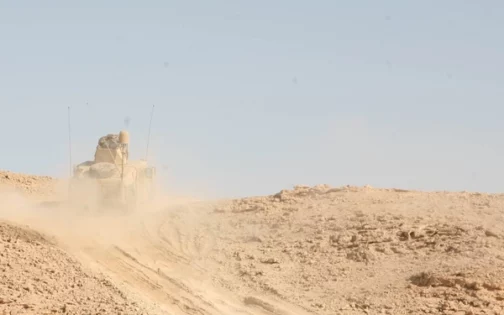
I walked over to my humvee, and the young private.
“I tried to get them to stop”
“Okay, what happened son?” I couldn’t help but feel sorry for him. I had no idea what I was going to do, or where I was going to take this. But the scene from inside that Tahoe was right behind my eyes, and I could still taste the blood-stench.
“Sir, they came up on us real fast, and I tried to get them to stop. I shot warning shots…”
“You shot warning shots first?”
“Yes, just like they told us.”
This was not what we had told them, and that was not the procedure.
“Okay, what next?”
“When they didn’t slow down, I tried waving at them to get them off the road.”
This was killing me. He had not memorized the script, and the order of his “escalation of force measures” was completely wrong. He had clearly had no idea what he was meant to do up there in his gun turret, making irreversible decisions about life and death.
“When did you fire the pen-flare?”
He looked at me blankly.
“Private, are you aware that your actions ended up killing a family of five?”
He visibly flinched.
“Sir, they were coming up on us real fast, and they could have attacked us!”
I could see him starting to lose it
I started to surge.
“Private, they were a family of five, with three babies…” my voice cracked. “Why would they have attacked you?”
He just stood there, breathing hard, and I could see him starting to lose it. All I could think of was the number of dead kids I had seen over the past year.
And the destroyed gravestones in Kosovo before that.
And the cockiness of all of us when we had arrived.
And the hatred in the eyes of the people we passed on the highways and streets.
On one level, I felt for him. I really did. But then, there were the dead babies…
He cracked.
“Sir, I didn’t mean to…”
I snapped.
“Didn’t FUCKING MEAN TO?!?”
I grabbed the chin strap of his helmet, and cursing the entire way, I dragged him to the Tahoe.
“Come here, goddammit! Look! Fucking LOOK AT THAT!”
By this time, he was a mess of snot and tears. Incoherent. Blubbering. Which enraged me even more.
“DIDN’T FUCKING MEAN TO?!? FUCKING LOOK AT THIS!”
I grabbed a tiny hand. Just a hand. And I picked it up and shoved it in his face.
“Look, goddammit! FUCKING LOOK! You didn’t fucking mean to, but that doesn’t make one goddamned bit of difference DOES IT? THEY’RE ALL FUCKING DEAD!”
By this time, the only thing holding up the young private was me. He was blubbering in mixed Spanish and English. He had pissed his pants.
Revulsion crashed on me like an ocean wave. Revulsion at myself, at him, at the smell of death, at the whole goddamned thing. I just wanted out of there.
Still holding his chin strap, I shoved him away from me as hard as I could, and he fell on his ass in the hard baked sand, sobbing and blowing snot.
I stomped over to the young sergeant.
A Solomonic choice
“I’m done. Police up your troop and report to Rawhide 6!”
I walked over to my humvee, got in, and reported to the convoy commander that I was finished, and that we could go when he was ready. And then I waited for the order to form up and move out.
I was numb. All I could think of was dead babies, and how badly I had reacted to the pitiful collapse of a young man. How I had made his situation so much worse.
I had a Solomonic choice to make. I could report the Truth, or at least what I strongly believed was the Truth, which could potentially send the young private to jail. Or, I could accept the Green 4 story which would let him move on, living with whatever guilt or justification he could find in his soul.
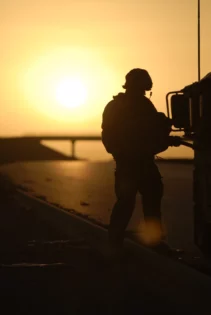
Either way, there was a father, mother, and three dead babies who were never coming back. There would be no justice for them either way.
And sitting in the back of my head the whole time was the image of the young Private, lying in a fetal position on the hard sand, blowing snot bubbles and covered in his own piss, calling for his mother and his god, and screaming at me that he “didn’t meant to.”
My course of action seemed clear
When we finally got to Al Assad about eight hours later, I was spent. As soon as we were released from the convoy, I found a spare cot and crashed. If I had not been able to sleep I would probably feel less guilty than I do now. But the truth is that I slept straight through for 12 hours.
When I awoke, my course of action seemed clear. There was no way I could prove that he had not followed the escalation of force protocols. The young Private had two witnesses to back him up. Already there was one ruined family. Ruining this kid and his family would not make anything right.
So I let it drop. The shoot was justified. No further action was required. A horrible accident of war. Just three more dead babies and their parents.
But whenever that metallic taste of blood hits my olfactories and makes me grimace, I see those kids.
Mike Holmes is a retired soldier who began his career jumping out of Hueys as a PFC cavalry scout, and retired 30 years later as a military intelligence lieutenant colonel. In between, he served in a variety of assignments and locations including the garden spots of Fort Drum, Panama, Kosovo, Iraq, and Afghanistan. He now lives in Washington DC.
 Soldier of Fortune Magazine The Journal of Professional Adventurers
Soldier of Fortune Magazine The Journal of Professional Adventurers


